| This blog explores social attitudes in Jane Austen's time, discusses her novels, reviews forgotten 18th century novels, and throws some occasional shade at the modern academy. The introductory post is here. My "six simple questions for academics" post is here. |
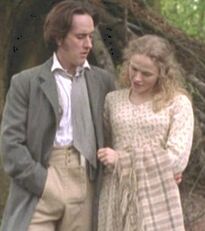 Sir Felix adjusting himself after dallying with Ruby in the woods.
Sir Felix adjusting himself after dallying with Ruby in the woods. In terms of real-world behavior, the mini-series version seemed more probable to me. Of course Sir Felix wouldn’t waste his time travelling down to the country to see Ruby, or take her out to the music hall in London, if she didn’t put out. And I wonder whether Trollope’s readers would have assumed the same.
Yet Trollope, perhaps for the sake of propriety, leaves Ruby undefiled. When push comes literally to shove in the novel, Ruby screams for help. She goes on to marry respectably. Her complacent fiancé asserts that she is a good girl. I think if she wasn't, she would have been fated to die by the end of the story, as is the fate of most fallen women in literature.
In Emma, Jane Austen references Goldsmith's short poem: "When lovely woman stoops to folly." I think Austen mentioned the "dying from shame" trope in a tongue-in-cheek manner. Recently, however, I’ve come across some examples of readers and critics arguing that there are some artfully hidden clues about sexual liaisons and love children in Jane Austen’s novels. If so, these are fallen women whose offences go undetected and unpunished.
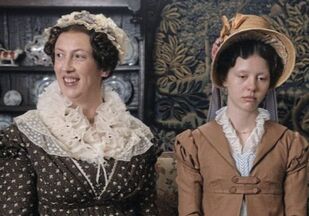 Hetty and Harriet. Miss Bates (Miranda Hart) and Harriet Smith (Mia Goth) in the 2020 adaption of Emma
Hetty and Harriet. Miss Bates (Miranda Hart) and Harriet Smith (Mia Goth) in the 2020 adaption of Emma “Nothing in the book remains a mystery if we read it carefully,” says Dr. Helena Kelly in Jane Austen: the Secret Radical. We know that Harriet Smith in Emma is the “natural daughter” of somebody. We learn at the end of the book that her father is a tradesman. But who is her mother? “Someone not altogether unconnected with the Bates family, perhaps,” Kelly suggests delicately. “Miss Bates twice refers to her mother calling her Hetty, which can be short for Harriet. Where other characters speak of ‘Harriet Smith,’ Miss Bates makes a point of never using Harriet’s first name… it’s not proof, but the indications seem to nudge us in the direction of concluding that Harriet and Jane Fairfax may well be half sisters."
That is, Miss Bates’s younger sister Jane married Lieutenant Fairfax, and they had a daughter, also named Jane. Lieutenant Fairfax died abroad and his widow sank “under consumption and grief soon afterwards" when little Jane was only three. But, perhaps before the unhappy Mrs. Fairfax died of tuberculosis, she had an illegitimate child with a well-off tradesman, and named the child after her older sister Harriet (aka Miss Bates). Young Harriet subsequently grows up in Mrs. Goddard’s boarding-school, never publicly acknowledged by either her father or mother’s family.
Another “Hetty” theory, first suggested in 1985 by Edith Lank, is that Harriet Smith is Miss Bates’s secret love child. This possibility has been bruited in Jane Austen fan fiction as well. Fan fiction, of course, can go in whatever direction the author chooses to take it, but the "Hetty" theories mentioned above have to do with what Austen herself intended.
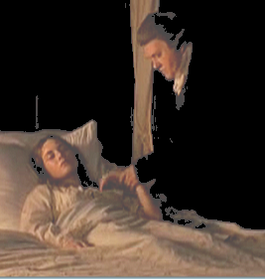 A secret confinement? How secret, exactly?
A secret confinement? How secret, exactly? In my opinion, Miss Bates is never presented as a hypocrite in Emma, never shown as a woman pretending to virtue but hiding a secret past. She is never held out as a woman nursing a secret sorrow and I can't think of any guilty or self-conscious interactions with Harriet. We're told of her "contented and grateful spirit" --which she would not deserve, not in the world of the 18th- and 19th- century novel. That is, Austen and her publisher would think twice before giving the readers a woman who had borne an illegitimate child who was not racked with guilt and remorse, and who manages to be alive at the end.
I had the same reaction after hearing Professor Robert Morrison’s talk at the recent JASNA convention in Victoria concerning Sense & Sensibility. He floated the idea that Austen intended for us to understand that Willoughby and Marianne had sex when they were supposedly touring his aunt’s house, and that Marianne’s subsequent illness was not a bad cold but a delivery or miscarriage of their secret love child. The reactions from the large audience ranged from, “oh, that’s an interesting idea,” to some serious pearl-clutching (from me, for example). I’ll delve into that more deeply another time.
In other novels of this era, the illegitimate child is very often proven to be not illegitimate after all, but the product of a secret marriage. In these cases, women who were accused of having out-of-wedlock children turn out to be innocent. They were secretly married and through misfortune, misunderstanding or malice, were falsely accused of immorality.
Fallen women, actual fallen women, usually suffer a severe fate. Apart from the earlier Georgian novel The History of Tom Jones (1749), I’ve encountered only one novel where a well-born lady had an illegitimate child (Consequences, or the Adventures of Rraxal Castle, 1796). The “consequences” of the title refer to the inevitable death of this girl who went astray, and likewise the death of her misguided brother, in a separate plotline. These deaths are presented as Heaven's judgement on the Earl of Rraxal because he neglected the moral education of his children.
I’ve encountered only one novel (Fanny Fitz-York, Heiress of Tremorne, 1818) where a girl from a good family ran off with her lover, sank into prostitution, and was forgiven and welcomed back home. Other such fallen women think too poorly of themselves to ever go back home, as in The History of Fanny Belton (1783), or they stumble home before they die, as in The Farmer of Inglewood Forest (1796). [Update] In Lady Maclairn, a victim of villany, (1806) a single woman forces her sister-in-law to pass herself off as the mother of an illegitimate child. The secret haunts both women and blights their lives, particularly the true mother. Miss Lucretia Flint is miserable, and miserable to others because of her secret, unlike the sunny Miss Bates, who certainly doesn't act lie a woman with a troubled conscience. Miss Flint dies a prolonged and painful death.
Could any of Austen's characters have borne an illegitimate child and then gone about their lives, as Tom Jones's mother basically did? We are told that Austen did not approve of Fielding's writing. Her brother said, "She did not rank any work of Fielding quite so high. Without the slightest affectation she recoiled from every thing gross. Neither nature, wit, nor humour, could make her amends for so very low a scale of morals." We know from her own letters that she returned Madame de Genlis's novel Alphonsine (1806), to the lending library. Alphonsine is the story of an unwed mother secretly raising her love-child in a cave to which her husband has confined her. Austen wrote, "We were disgusted in twenty pages, as, independent of a bad translation, it has indelicacies which disgrace a pen hitherto so pure.” Austen turned down an opportunity to meet French authoress Madame de Staël, and this may well have been because de Staël had an out-of-wedlock daughter. All the evidence we have suggests that Austen held the conventional moral views of a woman of her time.
Edmund Bertram objects to his sister Maria playing the lead in Lover's Vows because Agatha is an unwed mother. Colonel Brandon's lost love Eliza in Sense & Sensibility dies after having an illegitimate child, and this girl repeats her mother's unhappy fate, thanks to Willoughby. To the colonel, these are catastrophic events, and they are kept off-stage.
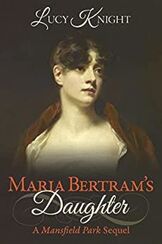
Maria Bertram, as we know, does not get off so lightly for adultery in Mansfield Park. She is banished from all good society forever. There is no mention of a child, but I think it is reasonable to assume that this would be a consequence of living with Henry in the hope that he would marry her after her divorce from Mr. Rushworth.
Author Lucy Knight’s debut Austenesque novel makes the logical assumption that Maria had an illegitimate child. Knight's heroine, Henrietta Rose, is passed off by Maria and Mrs. Norris as an orphaned relative whom they have charitably taken into their home. Soon, young Henrietta is off to school and has many subsequent adventures in this fast-paced novel. Knight’s next, Lydia Wickham’s Daughter, is forthcoming from Meryton Press.
In my Mansfield Trilogy, Maria's affair with Henry also led to a problem pregnancy, but with different outcomes. Click here for more about my novels.
And again, these books are fan fiction, a sequel and a variation respectively, not a re-interpretation of Austen's intentions.
When it comes to plots and plausibility, I think people should ask themselves a few questions before formulating their theories and the first question is, given how exhaustively Austen has been scrutinized and written about, why hasn't anyone noticed these hidden sub-plots until the modern era?
| Devoney Looser sketches out the distinction between Austen's "genius" for "opening up questions" in her stories, and those "people who will say this is a code for a completely other world below the surface" in this episode of The Austen Connection podcast. But she concludes, "these are novels that are trying to get us to investigate not only who the characters are but who we are." |
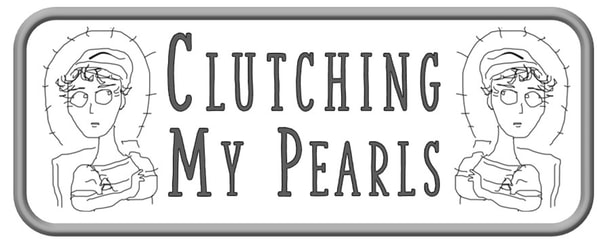
 RSS Feed
RSS Feed